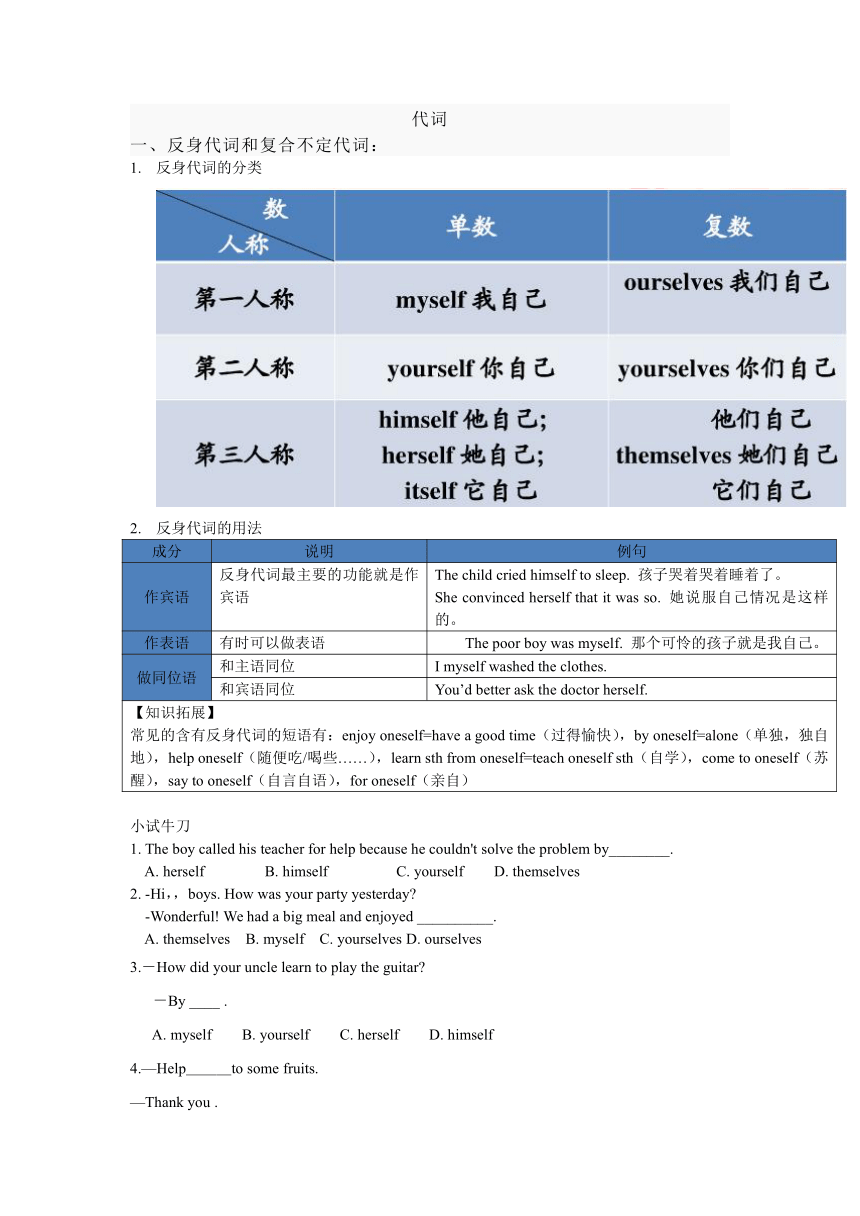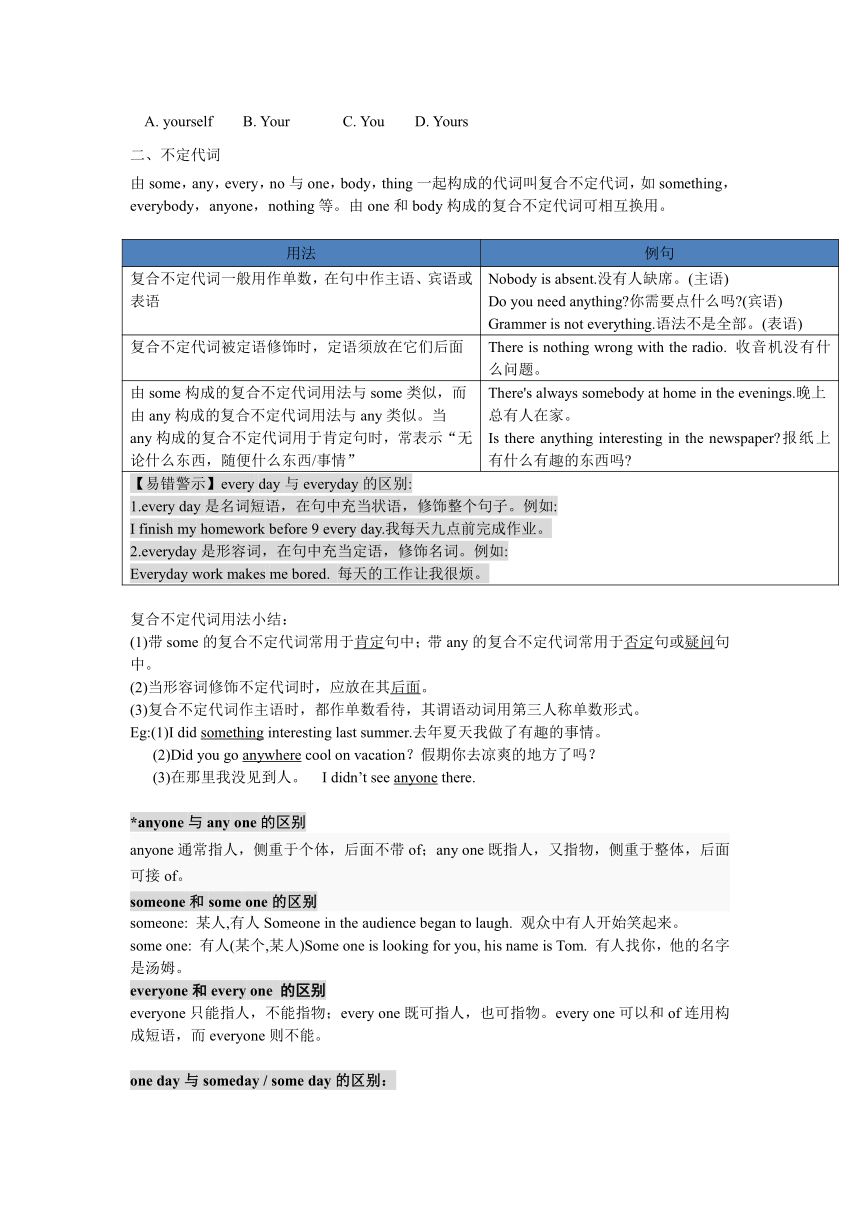Unit 1 Where did you go on vacation?代词学案
文档属性
| 名称 | Unit 1 Where did you go on vacation?代词学案 |  | |
| 格式 | docx | ||
| 文件大小 | 47.0KB | ||
| 资源类型 | 教案 | ||
| 版本资源 | 人教新目标(Go for it)版 | ||
| 科目 | 英语 | ||
| 更新时间 | 2021-08-23 14:34:25 | ||
图片预览


文档简介
代词
一、反身代词和复合不定代词:
反身代词的分类
反身代词的用法
成分
说明
例句
作宾语
反身代词最主要的功能就是作宾语
The
child
cried
himself
to
sleep.
孩子哭着哭着睡着了。
She
convinced
herself
that
it
was
so.
她说服自己情况是这样的。
作表语
有时可以做表语
The
poor
boy
was
myself.
那个可怜的孩子就是我自己。
做同位语
和主语同位
I
myself
washed
the
clothes.
和宾语同位
You’d
better
ask
the
doctor
herself.
【知识拓展】
常见的含有反身代词的短语有:enjoy
oneself=have
a
good
time(过得愉快),by
oneself=alone(单独,独自地),help
oneself(随便吃/喝些……),learn
sth
from
oneself=teach
oneself
sth(自学),come
to
oneself(苏醒),say
to
oneself(自言自语),for
oneself(亲自)
小试牛刀
1.
The
boy
called
his
teacher
for
help
because
he
couldn't
solve
the
problem
by________.
A.
herself
B.
himself
C.
yourself
D.
themselves
2.
-Hi,,boys.
How
was
your
party
yesterday?
-Wonderful!
We
had
a
big
meal
and
enjoyed
__________.
A.
themselves
B.
myself
C.
yourselves
D.
ourselves
3.-How
did
your
uncle
learn
to
play
the
guitar?
-By
____
.
A.
myself
B.
yourself
C.
herself
D.
himself
4.—Help___to
some
fruits.
—Thank
you
.
A.
yourself
B.
Your
C.
You
D.
Yours
二、不定代词
由some,any,every,no与one,body,thing一起构成的代词叫复合不定代词,如something,everybody,anyone,nothing等。由one和body构成的复合不定代词可相互换用。
用法
例句
复合不定代词一般用作单数,在句中作主语、宾语或表语
Nobody
is
absent.没有人缺席。(主语)
Do
you
need
anything?你需要点什么吗?(宾语)
Grammer
is
not
everything.语法不是全部。(表语)
复合不定代词被定语修饰时,定语须放在它们后面
There
is
nothing
wrong
with
the
radio.
收音机没有什么问题。
由some构成的复合不定代词用法与some类似,而
由any构成的复合不定代词用法与any类似。当
any构成的复合不定代词用于肯定句时,常表示“无
论什么东西,随便什么东西/事情”
There's
always
somebody
at
home
in
the
evenings.晚上
总有人在家。
Is
there
anything
interesting
in
the
newspaper?报纸上有什么有趣的东西吗?
【易错警示】every
day与everyday的区别:
1.every
day是名词短语,在句中充当状语,修饰整个句子。例如:
I
finish
my
homework
before
9
every
day.我每天九点前完成作业。
2.everyday是形容词,在句中充当定语,修饰名词。例如:
Everyday
work
makes
me
bored.
每天的工作让我很烦。
复合不定代词用法小结:
(1)带some的复合不定代词常用于肯定句中;带any的复合不定代词常用于否定句或疑问句中。
(2)当形容词修饰不定代词时,应放在其后面。
(3)复合不定代词作主语时,都作单数看待,其谓语动词用第三人称单数形式。
Eg:(1)I
did
something
interesting
last
summer.去年夏天我做了有趣的事情。
(2)Did
you
go
anywhere
cool
on
vacation?假期你去凉爽的地方了吗?
(3)在那里我没见到人。 I
didn’t
see
anyone
there.
anyone与any
one的区别
anyone通常指人,侧重于个体,后面不带of;any
one既指人,又指物,侧重于整体,后面可接of。
someone和some
one的区别
someone:
某人,有人Someone
in
the
audience
began
to
laugh.
观众中有人开始笑起来。
some
one:
有人(某个,某人)Some
one
is
looking
for
you,
his
name
is
Tom.
有人找你,他的名字是汤姆。
everyone和every
one
的区别
everyone只能指人,不能指物;every
one既可指人,也可指物。every
one可以和of连用构成短语,而everyone则不能。
one
day与someday
/
some
day的区别:
one
day“某一天,有一天”
既可用于一般过去时,也可用于一般将来时。
One
day,
a
stranger
came
to
my
house.
(指过去的一天,用过去时。)
I
will
achieve
my
dream
one
day.
某天我会实现梦想的。
(指将来,用将来时)
someday
=
some
day“
(将来的)某一天”用一般将来时。可以和one
day互换。?
We’ll
beat
them
someday.
有朝一日我们会打败他们的。
I’m
sure
I
can
win
someday.
我确信某天我会嬴。
Did
you
see
______
in
the
dining
room?
A.someone B.some
one
C.anyone
D.any
one
小试牛刀
1.—Your
English
is
very
good.Who
taught
you?
—________.I
learned
it
all
by
myself.
A.Somebody
B.Everybody
C.Nobody
D.Anybody
2.
---Is
there
___________
on
today’s
newspaper?
A.
something
important
B.
important
something
C.
anything
important
D.
important
anything
3.
There's
too
much
noise
here.
Let's
go_________.
A.
somewhere
quiet
B.
quiet
somewhere
C.
anywhere
quiet
D.
quiet
anywhere
4.一
What
else
do
we
need
for
the
picnic?
一
else.
I
get
everything
ready
now.
A.
Nothing
B.
Everything
C.
Something
D.
Anything
5.Our
teacher
was
very
happy
because
_____failed
the
examination.
A.
somebody
B.
nobody
C.
anybody
D.
everybody.
6.
--
Madam,
do
you
want
anything
else?
--
No,
I
need
.
A.
anything
more
B.
nothing
more
C.
something
more
D.
everything
7.There
is
_______
in
the
newspaper.Do
you
want
to
know
it?
A.new
something
B.new
anything
C.something
new
D.anything
new
三、正确区分下列单词的用法:
interest使感兴趣
interested对……感兴趣
interesting有趣的
excite使兴奋
excited感到兴奋
exciting兴奋的
relax使放松
relaxed感到放松
relaxing放松的
请辨析下列三个单词。
(1)bore:动词,意为“使厌烦”,后直接接宾语。
(2)bored:形容词,意为“感到厌烦的,无聊的”,主语为人。
(3)boring:形容词,意为“令人无聊的,乏味的”,修饰物。
针对检测
The
book
is
very
.I
feel
.(boring,bored)
总结
(1)询问假期你做了什么的句型及回答:
What
did
you
do
on
vacation?I
had
a
picnic.
(2)询问假期你去了哪里度假的句型及回答:
Where
did
you
go
on
vacation?I
went
to
the
countryside.
(3)询问那里的天气如何的句型及回答:
How
was
the
weather?It
was
sunny.
(4)询问那里的人们如何的句型及回答:
How
were
the
people?They
were
very
friendly.
一、反身代词和复合不定代词:
反身代词的分类
反身代词的用法
成分
说明
例句
作宾语
反身代词最主要的功能就是作宾语
The
child
cried
himself
to
sleep.
孩子哭着哭着睡着了。
She
convinced
herself
that
it
was
so.
她说服自己情况是这样的。
作表语
有时可以做表语
The
poor
boy
was
myself.
那个可怜的孩子就是我自己。
做同位语
和主语同位
I
myself
washed
the
clothes.
和宾语同位
You’d
better
ask
the
doctor
herself.
【知识拓展】
常见的含有反身代词的短语有:enjoy
oneself=have
a
good
time(过得愉快),by
oneself=alone(单独,独自地),help
oneself(随便吃/喝些……),learn
sth
from
oneself=teach
oneself
sth(自学),come
to
oneself(苏醒),say
to
oneself(自言自语),for
oneself(亲自)
小试牛刀
1.
The
boy
called
his
teacher
for
help
because
he
couldn't
solve
the
problem
by________.
A.
herself
B.
himself
C.
yourself
D.
themselves
2.
-Hi,,boys.
How
was
your
party
yesterday?
-Wonderful!
We
had
a
big
meal
and
enjoyed
__________.
A.
themselves
B.
myself
C.
yourselves
D.
ourselves
3.-How
did
your
uncle
learn
to
play
the
guitar?
-By
____
.
A.
myself
B.
yourself
C.
herself
D.
himself
4.—Help___to
some
fruits.
—Thank
you
.
A.
yourself
B.
Your
C.
You
D.
Yours
二、不定代词
由some,any,every,no与one,body,thing一起构成的代词叫复合不定代词,如something,everybody,anyone,nothing等。由one和body构成的复合不定代词可相互换用。
用法
例句
复合不定代词一般用作单数,在句中作主语、宾语或表语
Nobody
is
absent.没有人缺席。(主语)
Do
you
need
anything?你需要点什么吗?(宾语)
Grammer
is
not
everything.语法不是全部。(表语)
复合不定代词被定语修饰时,定语须放在它们后面
There
is
nothing
wrong
with
the
radio.
收音机没有什么问题。
由some构成的复合不定代词用法与some类似,而
由any构成的复合不定代词用法与any类似。当
any构成的复合不定代词用于肯定句时,常表示“无
论什么东西,随便什么东西/事情”
There's
always
somebody
at
home
in
the
evenings.晚上
总有人在家。
Is
there
anything
interesting
in
the
newspaper?报纸上有什么有趣的东西吗?
【易错警示】every
day与everyday的区别:
1.every
day是名词短语,在句中充当状语,修饰整个句子。例如:
I
finish
my
homework
before
9
every
day.我每天九点前完成作业。
2.everyday是形容词,在句中充当定语,修饰名词。例如:
Everyday
work
makes
me
bored.
每天的工作让我很烦。
复合不定代词用法小结:
(1)带some的复合不定代词常用于肯定句中;带any的复合不定代词常用于否定句或疑问句中。
(2)当形容词修饰不定代词时,应放在其后面。
(3)复合不定代词作主语时,都作单数看待,其谓语动词用第三人称单数形式。
Eg:(1)I
did
something
interesting
last
summer.去年夏天我做了有趣的事情。
(2)Did
you
go
anywhere
cool
on
vacation?假期你去凉爽的地方了吗?
(3)在那里我没见到人。 I
didn’t
see
anyone
there.
anyone与any
one的区别
anyone通常指人,侧重于个体,后面不带of;any
one既指人,又指物,侧重于整体,后面可接of。
someone和some
one的区别
someone:
某人,有人Someone
in
the
audience
began
to
laugh.
观众中有人开始笑起来。
some
one:
有人(某个,某人)Some
one
is
looking
for
you,
his
name
is
Tom.
有人找你,他的名字是汤姆。
everyone和every
one
的区别
everyone只能指人,不能指物;every
one既可指人,也可指物。every
one可以和of连用构成短语,而everyone则不能。
one
day与someday
/
some
day的区别:
one
day“某一天,有一天”
既可用于一般过去时,也可用于一般将来时。
One
day,
a
stranger
came
to
my
house.
(指过去的一天,用过去时。)
I
will
achieve
my
dream
one
day.
某天我会实现梦想的。
(指将来,用将来时)
someday
=
some
day“
(将来的)某一天”用一般将来时。可以和one
day互换。?
We’ll
beat
them
someday.
有朝一日我们会打败他们的。
I’m
sure
I
can
win
someday.
我确信某天我会嬴。
Did
you
see
______
in
the
dining
room?
A.someone B.some
one
C.anyone
D.any
one
小试牛刀
1.—Your
English
is
very
good.Who
taught
you?
—________.I
learned
it
all
by
myself.
A.Somebody
B.Everybody
C.Nobody
D.Anybody
2.
---Is
there
___________
on
today’s
newspaper?
A.
something
important
B.
important
something
C.
anything
important
D.
important
anything
3.
There's
too
much
noise
here.
Let's
go_________.
A.
somewhere
quiet
B.
quiet
somewhere
C.
anywhere
quiet
D.
quiet
anywhere
4.一
What
else
do
we
need
for
the
picnic?
一
else.
I
get
everything
ready
now.
A.
Nothing
B.
Everything
C.
Something
D.
Anything
5.Our
teacher
was
very
happy
because
_____failed
the
examination.
A.
somebody
B.
nobody
C.
anybody
D.
everybody.
6.
--
Madam,
do
you
want
anything
else?
--
No,
I
need
.
A.
anything
more
B.
nothing
more
C.
something
more
D.
everything
7.There
is
_______
in
the
newspaper.Do
you
want
to
know
it?
A.new
something
B.new
anything
C.something
new
D.anything
new
三、正确区分下列单词的用法:
interest使感兴趣
interested对……感兴趣
interesting有趣的
excite使兴奋
excited感到兴奋
exciting兴奋的
relax使放松
relaxed感到放松
relaxing放松的
请辨析下列三个单词。
(1)bore:动词,意为“使厌烦”,后直接接宾语。
(2)bored:形容词,意为“感到厌烦的,无聊的”,主语为人。
(3)boring:形容词,意为“令人无聊的,乏味的”,修饰物。
针对检测
The
book
is
very
.I
feel
.(boring,bored)
总结
(1)询问假期你做了什么的句型及回答:
What
did
you
do
on
vacation?I
had
a
picnic.
(2)询问假期你去了哪里度假的句型及回答:
Where
did
you
go
on
vacation?I
went
to
the
countryside.
(3)询问那里的天气如何的句型及回答:
How
was
the
weather?It
was
sunny.
(4)询问那里的人们如何的句型及回答:
How
were
the
people?They
were
very
friendly.
同课章节目录
- Unit 1 Where did you go on vacation?
- Section A
- Section B
- Unit 2 How often do you exercise?
- Section A
- Section B
- Unit 3 I'm more outgoing than my sister.
- Section A
- Section B
- Unit 4 What's the best movie theater?
- Section A
- Section B
- Unit 5 Do you want to watch a game show?
- Section A
- Section B
- Unit 6 I'm going to study computer science.
- Section A
- Section B
- Unit 7 Will people have robots?
- Section A
- Section B
- Unit 8 How do you make a banana milk shake?
- Section A
- Section B
- Unit 9 Can you come to my party?
- Section A
- Section B
- Unit 10 If you go to the party, you'll have a grea
- Section A
- Section B
